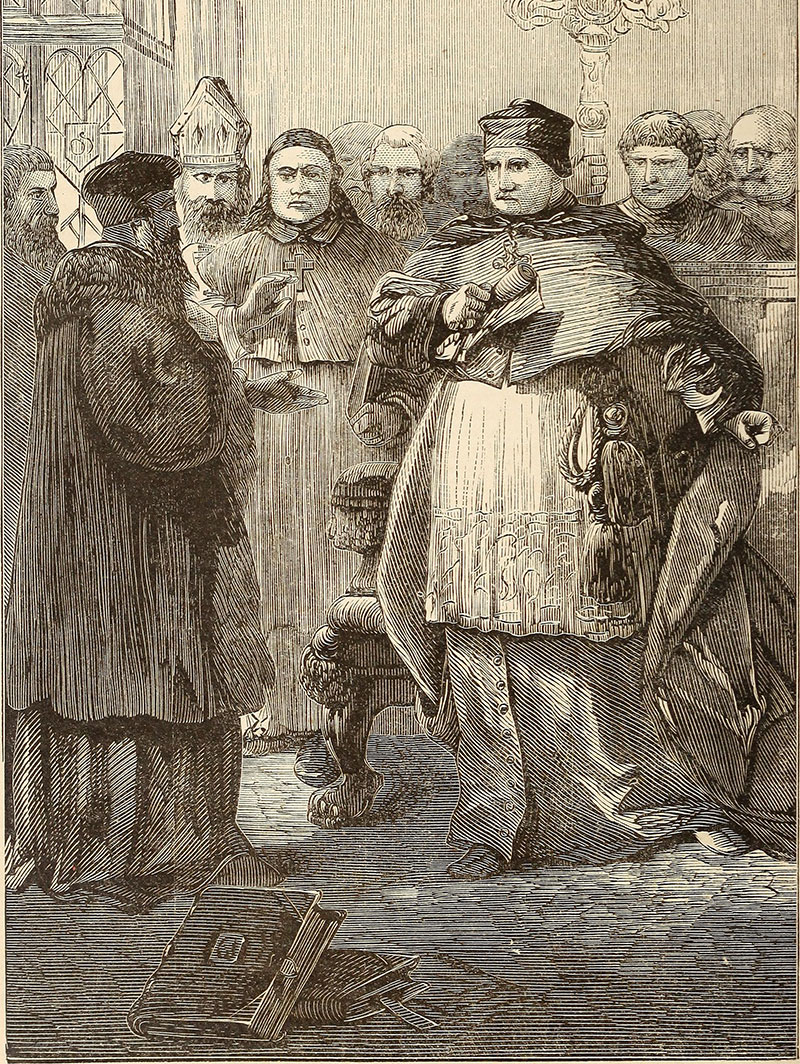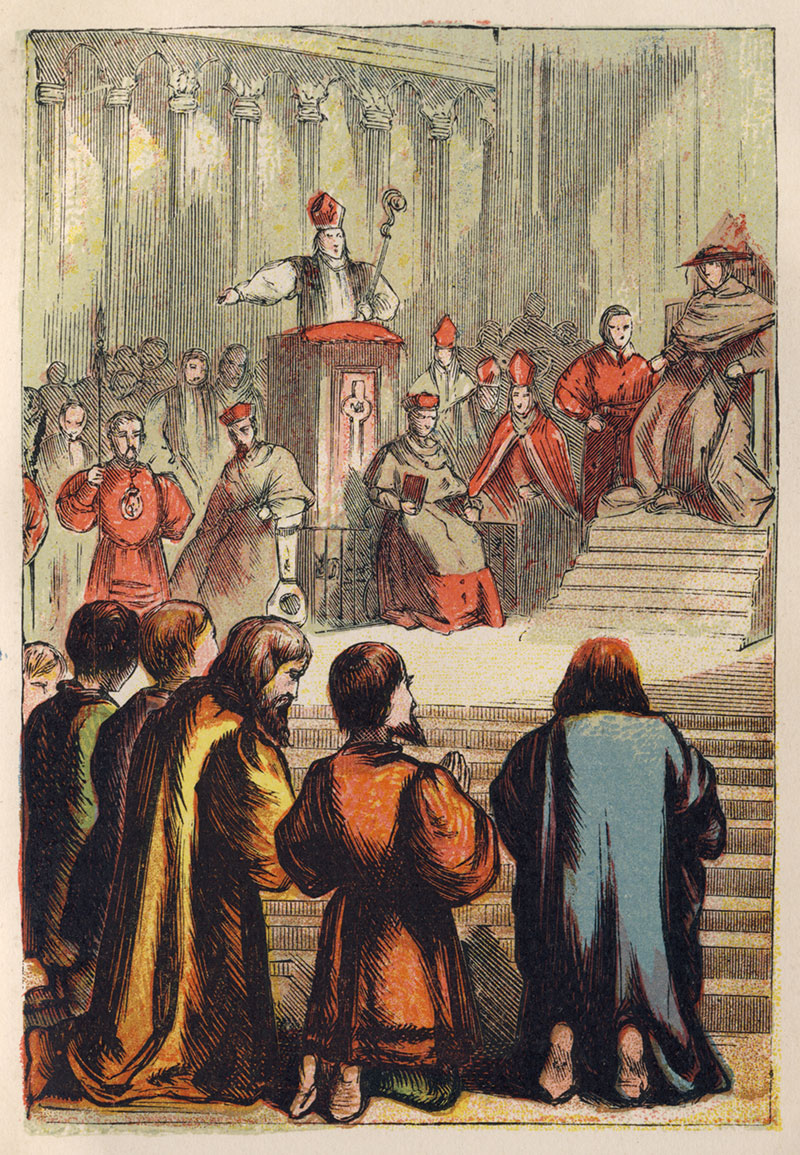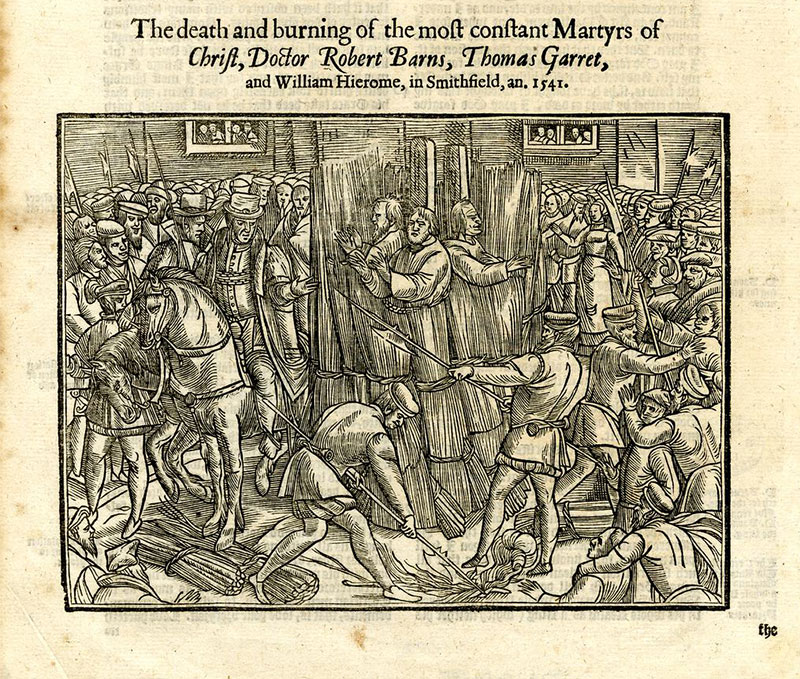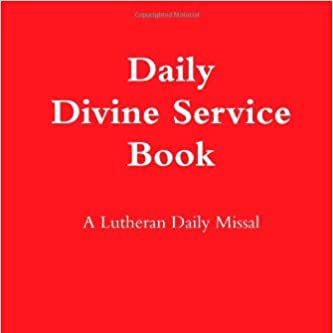A Lutheran in England

A saint known for his Lutheran convictions, Robert Barnes lived in the thick of the Reformation era, taking a front seat in the revolution it caused across Europe as a Lutheran, priest, doctor, and devoted Englishman. Born in Norfolk in 1495, Barnes was educated from a young age. He ended up an Augustinian priest and studied at Cambridge in his mid-twenties—he graduated from there with his Doctor of Divinity in 1523 and became the prior for a nearby convent.
He was first introduced to Lutheran theology at a regular gathering of like-minded theologians at the White Horse Inn in Cambridge. Like many at the time, Barnes quickly became enamored with the Reformation and in 1525 preached a decidedly “Lutheran” sermon at the Christmas Day Midnight Mass at the Cambridge St. Edward’s Church. This was during the time when King Henry VIII and other high-ranking English officials were feverishly trying to stop the smuggling of Martin Luther’s books into England. Given these circumstances, Barnes’s sermon could not go unaddressed, and in 1526, he was disciplined and sent to prison.
This seemed to make no impact on him, however, and after his initial sentence and later house arrest, Barnes continued his Reformation inclinations, secretly distributing illegal copies of William Tyndale’s English Bible to interested parties. In 1528, Barnes was able to escape to Antwerp and eventually found himself in Wittenberg, where he sought the companionship of Martin Luther. He became a guest at Martin and Katie’s estate and developed a plan to more systematically bring Lutheranism to England. He published his work titled A Supplication to Henry VIII, which made an appeal to the king. Eventually, Thomas Cromwell (the king’s principal advisor) caught wind of this and was so impressed with Lutheran political philosophy that he invited Barnes home, where he returned in 1531.
At first, Barnes’s attempts seemed promising, and he hoped that the King would adopt Lutheranism and bring Reformation doctrine to the Church of England. However, by 1538 the king refused to embrace Lutheranism, disillusioned by its stern refusal to let him divorce and remarry. It turned out that the king was simply looking for anyone to support his pleas for divorce, having his petition previously rejected by the pope, which led to the separation of the Church of England from the Church of Rome. After a messy period of discourse between Lutherans, Roman Catholics, and other Protestant-minded individuals (which included many sermons and counter-sermons in the name of and against Reformation teachings), Cromwell was executed on July 28, 1540, on Tower Hill by the ax, and Robert Barnes was convicted of heresy, sentenced to execution by burning at the stake two days later, on July 30.

Two fellow Lutheran pastors, William Jerome and Thomas Gerrard were also burnt. It is said that Barnes was faithful until the very end, praying, “Lord, open the king of England’s eyes!” right before he died.
A Brief History
Word of Robert Barnes’s and his colleagues’ martyrdom quickly spread across Europe, with many greatly impacted by the deaths. Upon hearing of their executions, Martin Luther wrote:
“This Dr. Robert Barnes we certainly knew, and it is a particular joy for me to hear that our good, pious dinner guest and houseguest has been so graciously called by God to pour out his blood and to become a holy martyr for the sake of His dear Son. Thanks, praise, and glory be to the Father of our dear Lord Jesus Christ, who again, as at the beginning, has granted us to see the time in which His Christians, before our eyes and from our eyes and from beside us, are carried off to become martyrs (that is, carried off to heaven) and become saints.…[Barnes] always hoped his king would become good in the end. Let us praise and thank God! This is a blessed time for the elect saints of Christ, and an unfortunate time for the devil, for blasphemers and enemies, and it is going to get worse. Amen.”
Luther also published Barnes’s Confession of Faith and wrote a dedicatory preface to it, showcasing the importance of Barnes to the Reformation at the time. However, Barnes continues to be of importance to Lutherans today, too, especially English-speaking ones, reminding us of the great work and sacrifice it has taken and continues to take to spread the Word of God to all.

Collect
Grant, we beseech Thee, Almighty God: that, celebrating the heavenly birthday of Blessed Robert, Thy Martyr, we may, by his example, be emboldened in our faith toward Thee; through Jesus Christ our Lord, who liveth and reigneth with Thee and the Holy Ghost: ever one God, world without end. Amen.
Resources
Issues, Etc. interview with the Rev. Dr. Jeff Leininger on Sixteenth Century Lutheran Martyr, Robert Barnes
Issues, Etc. interview with the Rev. Dr. Korey Maas on Sixteenth Century Confessor and Martyr Robert Barnes
Issues, Etc. interview with Dr. Matt Phillips on Sixteenth Century Confessor and Martyr Robert Barnes
Propers found in Daily Divine Service Book: A Lutheran Daily Missal, edited by the Rev. Heath Curtis
References:
1. Hemmer, Jeffrey. “Robert Barnes: Even Death.” July 29, 2022. Lutheran Witness.
2. LCMS. “Robert Barnes: A Lutheran Martyr in England.” July 30, 2017. The Lutheran Church Missouri Synod Resources.
3. Maas, Korey D. “Confession, Contention, and Confusion: The Last Words of Robert Barnes and the Shaping of Theological Identity.” The Sixteenth Century Journal 42, no. 3 (2011): 689–707.
2. Weedon, William. Celebrating the Saints. Concordia Publishing House. 2016.
Images:
1. Barnes appearing before Cardinal Wolsey, J.H. Merle d’Aubigné in History of the Great Reformation in Europe in the Times of Luther and Calvin, England, 1870.
2. Barnes and His Fellow-Prisoners Seeking Forgiveness, from Foxes’s Book of Martyrs, England, 1887.
3. The Death and Burning of the Most Constant Martyrs of Christ, Doctor Robert Barns, Thomas Garret, and William Hierome, from Foxes’s Book of Martyrs, England, ca. sixteenth century.
Some links might be affiliate links which means we may receive a small commission at no extra cost to you. As an Amazon Associate we earn from qualifying purchases.




[…] you already do or not, all Lutherans should know of St. Robert Barnes and his day on July 30th. No matter your level of familiarity with this Englishman, though, you […]